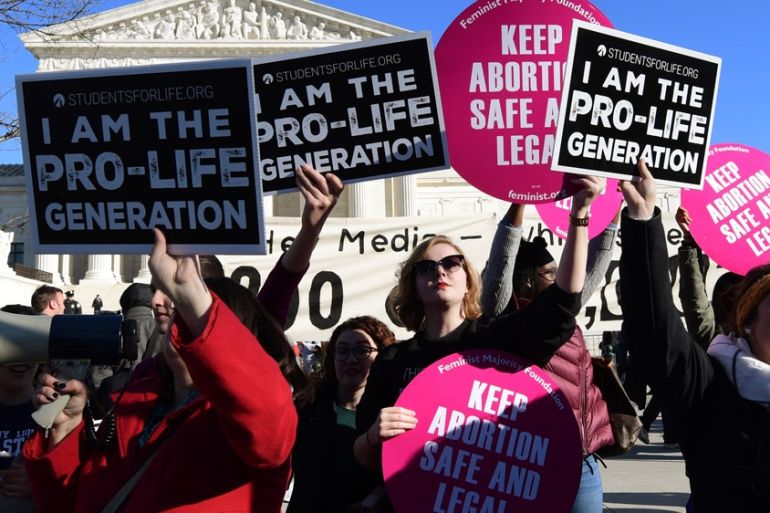US: Kansas court bolsters abortion rights, blocks ban
State’s Supreme Court ruling represents a big victory for abortion rights supporters.

The highest court in the US state of Kansas ruled for the first time on Friday that the state’s constitution protects abortion rights and blocked a first-in-the-nation ban on a common second-trimester method for ending pregnancies.
The state Supreme Court’s ruling represented a big victory for abortion rights supporters in a state with a Republican-controlled Legislature hostile to their cause.
Keep reading
list of 4 itemsMembers of London’s Garrick Club vote to let women join for first time
Why has Australia declared a ‘national crisis’ over violence against women?
Manhattan prosecutors announce retrial for film producer Harvey Weinstein
It comes with other Republican-controlled states moving to ban most abortions in direct challenges to the US Supreme Court’s historic 1973 Roe v Wade decision legalising abortions across the nation.
The Kansas decision prevents the state from enforcing a 2015 law that could have greatly limited second-trimester abortions.
The ruling also clears the way for legal challenges to a string of abortion restrictions approved in recent years by state legislators under past Republican governors.
The court said vague language in the Kansas Constitution guaranteeing individual rights protects a woman’s right to obtain an abortion independent of the US Constitution.
Kansas courts could, therefore, strike down restrictions that have been upheld by the federal courts.
The ruling is certain to prompt abortion opponents to push to amend the state’s constitution.
Democratic Governor Laura Kelly, who took office in January, is a strong abortion-rights supporter, but the Legislature still has solid anti-abortion rights majorities.
In previous cases, Kansas’s highest court avoided the question, allowing US Supreme Court decisions to determine what restrictions would be allowed.
But a state district court judge ruled in blocking the 2015 law that the Kansas Constitution grants its own protections.
Reproductive rights groups have said US President Donald Trump has waged a war against them, employing policies that have harmed women’s right to choose.
Since taking office, Trump has reinstated and expanded the Global Gag Rule, which bans international organisations that receive US funding from providing abortion services or offering information about the procedure.
‘Natural rights’
The decision comes two years after the Kansas court heard arguments from attorneys, an unusually long delay for a ruling. Iowa’s Supreme Court issued a similar decision in 2018.
The Kansas Bill of Rights says residents have “natural rights” including “life, liberty and the pursuit of happiness” and that “free governments” were created for their “equal protection and benefit”.
The state’s lawyer argued there is no evidence that when the Kansas Constitution was written in 1859, its drafters contemplated abortion rights.
In the Kansas Territory, abortion was illegal except to save a woman’s life, and that policy carried over in the new state’s laws.
The Kansas law at issue would bar physicians from using forceps or similar instruments on a live fetus to remove it from the womb in pieces, using the non-medical term “dismemberment abortion” to describe the procedure.
Such instruments are commonly used in dilation and evacuation procedure, which the Center for Reproductive Rights has described as the safest and most common abortion procedure in the United States in the second trimester.
The Kansas law was model legislation drafted by the National Right to Life Committee.
The group said similar bans have been enacted in 10 other states – Oklahoma, West Virginia, Mississippi, Alabama, Louisiana, Arkansas, Texas, Kentucky, Ohio and North Dakota.
Abortion providers reported performing 484 dilation and evacuation procedures in Kansas in 2018, according to state health department statistics.
That was 6.9 percent of the state’s total abortions; most pregnancies were terminated during the first trimester.
The lawsuit against the Kansas law was filed by Dr Herbert Hodes and Dr Traci Nauser, a father and daughter who operated a women’s health centre together in the Kansas City suburb of Overland Park. Hodes has since retired.
After the district judge’s ruling put the law on hold, the Kansas Court of Appeals split 7-7, allowing the judge’s decision to stand.